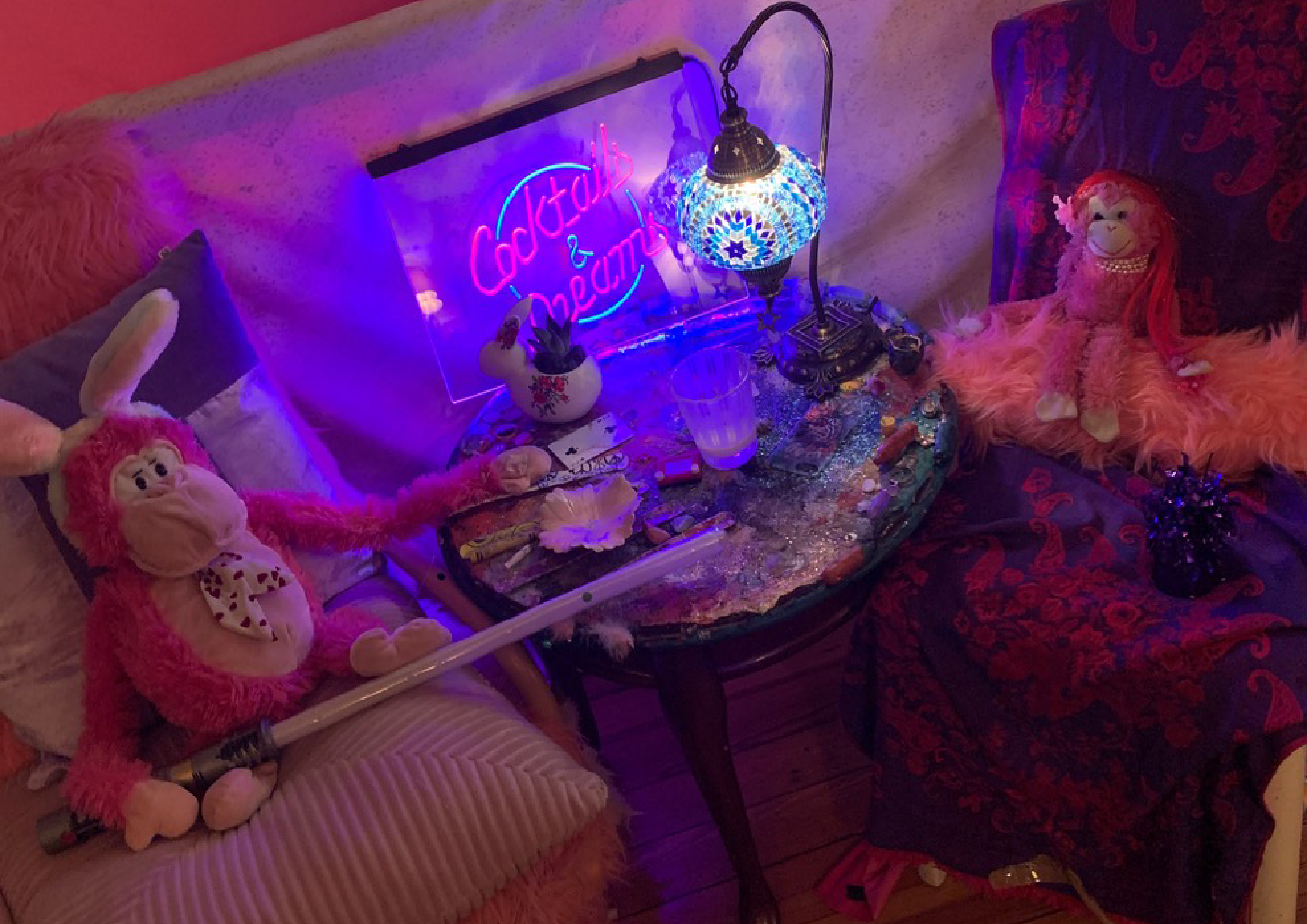Puppet Shows and Presentations: Performing Arts Students Rise to the Zoom Challenge

Professor Natsu Onoda Power
When Georgetown transitioned to online learning in response to COVID-19, students in some Department of Performing Arts and other courses faced unusual obstacles in completing their assignments. A number of students from professor Natsu Onoda Power’s classes adapted to these challenges in innovative and engaging ways.
Puppet Shows
Performance pieces are traditionally offered in person to a live audience. The students in Onoda Power’s Performing Madness course, which investigates how the idea of mental illness is represented or performed, quickly adjusted to their new Zoom platform by using the medium for their presentations.
Bobbie Benjamin (C’21), for example, staged a puppet show in her living room of the last scene of Cyrano de Bergerac. She initially joined the Zoom call with her video turned off, and informed the class that the “guest artist” was preparing for the performance. Benjamin encouraged the students and their professor to check out the Instagram account of the guest artist, which featured photos posted by the puppet Cyrano from scenes in the play.
When Benjamin eventually activated the camera, the class saw two puppets on a sofa enacting the last scene of the play. The camera was tightly focused so that the audience could not see the puppeteers. When Cyrano dies at the end of the scene, Benjamin turned her laptop camera on herself and said that the show was over because Cyrano had just died.
“It really leaned into the ability of Zoom to control what the audience is seeing, unlike live performance, which has limited abilities to control audience focus,” Onoda Power says.
The new platform was not only pleasing the audience, but also was a joy for Benjamin as well.
“I found the strange new format oddly freeing, and figuring out my performance has been a highlight of my quarantine,” she says.
Performing Madness
Paula Hong (C’20) and Meg Edwards (C’20) also took advantage of a virtual stage by recreating a scene from The Man Who by Peter Brook, a play adapted from the book by Oliver Sacks, The Man Who Mistook His Wife for a Hat. The scene was originally performed on stage, where the audience would switch back and forth to look at each character from head to toe. The Zoom call allowed Hong and Edwards to share the audience’s attention through a split screen and closeups on their faces.
The dialogue was pre-recorded but presented as if it were live. Since Hong and Edwards shared everyone’s desktops, the audience also saw one character in the role of “therapist” played by Hong, taking notes in the Zoom chat while Edwards served as the “patient.”
“They found a way to truly harness the strengths of the medium – they used the ability to show close-ups, to show two screens simultaneously, to have two characters facing “out” to the audience while still carrying on a dialogue directly looking at each other and to clearly “show” the subtext of the scene,” Onoda Power explains.
Staged Madness
While some students chose to collaborate with one another or work alone on projects, Jonathan Kay (C’22) decided to seek Onoda Power’s assistance to pull off a performance piece. Kay emailed Onoda Power, saying that he was going to come to class late and asked her to follow the script he provided:
Kay: I’m going to zoom in at 3:10. If you wouldn’t mind, could you say the following, it will lead into my performance.
Onoda Power: Jonathan, thanks for showing up. Over an hour into class.
Kay: An hour? What, I thought it was 3:10!
Onoda Power: It’s 4:10. And you have just interrupted your fellow students. This is a very disappointing pattern of behavior, Jonathan. I mean, I’ve tried being nice, I’ve tried everything. But now you’re going to have to take the consequences. This is the real world.
Kay: I’m, I’m sorry, I’ll umm, I’m just gonna, I’ll go, I didn’t mean to interrupt, I’m just gonna, I’ll go..
After this dialogue, Kay “left” the meeting, “accidentally” leaving Zoom on.
After that, the class witnessed his “alternate personality” surfacing, in which Kay showed signs of a mental breakdown that normally would have been private.
Discarded Narratives
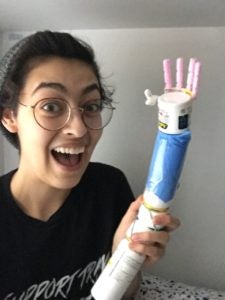
Maddy Rice (C’20) with a hand puppet
Maddy Rice (C’20) completed their final project titled “Discarded Narratives,” which examined the reciprocal relationships between disposability, ecological degradation and human health, such as contamination of the environment becoming contamination of our bodies and vice versa.
To complete their project, Rice sent out a virtual questionnaire to respondents asking them to answer one of three questions:
- What have you lost, let go of or left behind since you’ve received treatment?
- What have you seen your friend or family member leave behind since you have seen them receive treatment?
- What have you lost by not being able to receive meaningful treatment?”
Rice then made leaves out of paper and wrote the responses down on them. Blue leaves represented someone who had undergone treatment, yellow leaves a response from the friend or family member of a patient and orange leaves represented an individual who had not yet received treatment.
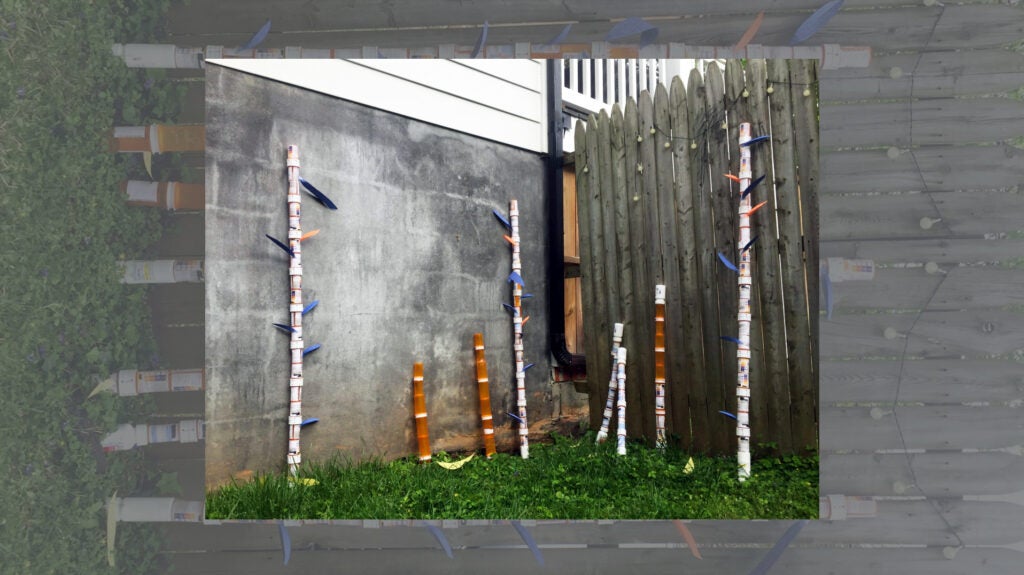
Bamboo made from medicine bottles from Discarded Narratives
The senior attached the leaves to bamboo rods constructed out of medicine bottles to represent accumulation and invasion.
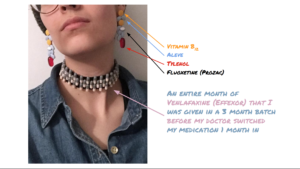
Prescription jewelry from Discarded Narratives
Finally, Rice created jewelry and a hand puppet out of medications for their final performance piece.
In their reflections on the class, Rice spoke of how impressive it is that this class has not only continued but thrived during the pandemic.
“Professor Onoda Power has created the most adaptive classroom that I’ve been a part of, by far,” says they. “It is incredible that a performance class could happen this well online, but she made it happen.”
Adaptation, Performance of Literature

Jake Teall (C’20)
Jake Teall (C’22) was a student in Onoda Power’s Adaptation and Performance of Literature course designed to engage students in an experiential and experimental approach.
The professor adjusted her original assignment to respond in the form of an imaginary online chat with Linda Hutcheon, a theorist whose work the class studied. Teall decided to make the conversation “occur” through text.
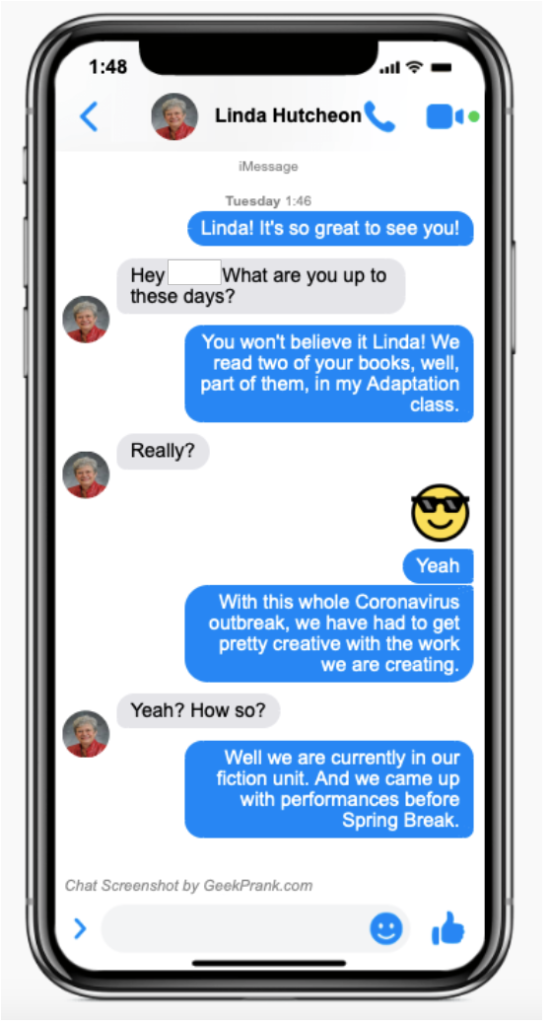
These creative solutions are just a few examples of the ways that some Georgetown students and faculty have not only adapted, but thrived during a time of uncertainty and change.
Soyica Colbert, vice dean of faculty and director of arts initiatives, says Onoda Power and her students have more than risen to the occasion of rethinking one of the fundamental questions of theatre: what can we create together?
“As Georgetown has transitioned to online learning, some subjects have been easier to translate to the new learning environment than others,” says Colbert, also a professor of African American Studies and Performing Arts and the Idol Family Professor of the College of Arts and Sciences. “When confronted with the challenge to teach Theater and Performance Studies online, Onoda Power did what she always does – make something new. The lessons students learn this semester will change how we think about live performance and what it means to go to the theatre.”
